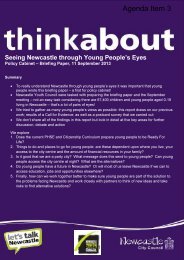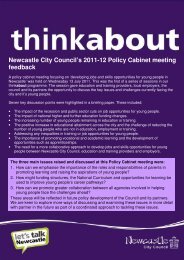NEWCASTLE'S MUSICAL HERITAGE AN INTRODUCTION By ...
NEWCASTLE'S MUSICAL HERITAGE AN INTRODUCTION By ...
NEWCASTLE'S MUSICAL HERITAGE AN INTRODUCTION By ...
You also want an ePaper? Increase the reach of your titles
YUMPU automatically turns print PDFs into web optimized ePapers that Google loves.
introduced Wagner for the first time in Newcastle. And so these concerts<br />
continued until 1873 with Mr Rea taking a leading role and continually introducing<br />
new works into his interesting and varied programmes.<br />
Some idea of the occasion when Dr Rea introduced his Promenade Concerts<br />
in Newcastle can be gleaned from the press report of 4 th February 1867,<br />
following the first concert.<br />
(Dr Rea held the) ‘First of a series of orchestral promenade concerts in the<br />
Town Hall inaugurating a project which he has long had at heart and taking a<br />
step deserving of every encouragement and success and to say the least of it,<br />
most courageous. A strong well-balanced company of artists have been<br />
engaged. His intentions are to give concerts nightly for one month and it remains<br />
to be seen whether there is in the district that taste for high-class music, skilfully<br />
and harmoniously rendered to repay the necessary trouble and anxiety –<br />
Whether in fact there will be such audiences as to make financially successful<br />
what, in itself may be predicted a thorough success and whether the immediate<br />
effect will be the establishment of an orchestral society consisting of a picked<br />
number of our local musicians. Nothing of its kind could have been better and<br />
certainly nothing of its kind would have given greater relish and satisfaction than<br />
did the concert of last night.’<br />
The review went on to say that there was an audience numerous and fashionable<br />
and anything if not appreciative and they did not scruple in the bestowal of their<br />
applause. The hall was tastefully decorated with flags, banners and trophies<br />
bearing the names of the great masters and a refreshment stall had been<br />
opened.<br />
Following a later concert in the autumn of that same year the press reported<br />
that from the moment the doors were opened there was a constant stream of<br />
people. Mostly season ticket holders but the demand had exceeded the supply<br />
and there had been a limit put on them so that some parts of the hall could be<br />
available to the general public. These areas were the gallery and the rear of the<br />
area, presumably downstairs. It was reported that the limited number of tickets<br />
available caused disappointment ‘but the mortification they at present experience<br />
will not be without its advantages if it teaches the danger of procrastination and<br />
lead them on a future occasion to take time by the forelocks and secure their<br />
tickets at an early period’.<br />
I am sure that many reader’s will have already latched onto the fact that Rea’s<br />
Promenade Concerts were thirty years ahead of Henry Wood’s and further<br />
comparisons would disclose many similar features between the two. I would<br />
hesitate to suggest, however, that Promenade concerts were Mr Rea’s idea, they<br />
were not, and the concept had been around for some time. One outside force<br />
that influenced change in this direction was Johann Strauss, senior, when he<br />
visited England with his orchestra in 1838 and toured the country widely,<br />
44

















